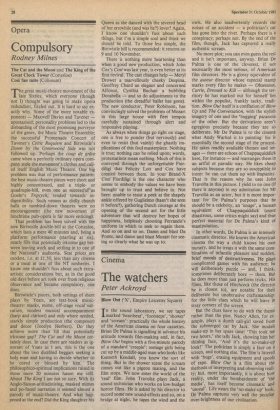Opera
Compulsory
Rodney Milnes The Cat and the Moon and The King of the Great Clock Tower (Cottesloe) Cosi fan tulle (Coliseum) The great music-theatre movement of the late Sixties, which everyone (though not I) thought was going to make opera redundant, fizzled out. It is hard to say exactly why. Some of the more notable exponents — Maxwell Davies and Tavener — apostasised; personality problems led to the disbanding of the most promising purveyor of the genre, the Music Theatre Ensemble; the successful Promenade Concert of Tavener's Celtic Requiem and Birtwistle's Down by the Greenwood Side was not followed up. Perhaps the coup de grace came when a perfectly ordinary opera company stole the movement's clothes and called itself English Music Theatre. One big problem was that of performance pattern: the best music-theatre pieces were short and highly concentrated, and a tripleor quadruple-bill, even one as successful as Goehr's Triptych, tended towards indigestibility. Such venues as chilly church halls or tumbled-down theatres were no encouragement (the new movement of lunchtime pub-opera is far more enticing).
That problem has been solved with the new Birtwistle double-bill at the Cottesloe, which lasts a mere 40 minutes and, being a platform performance (starting at six), neatly fills that potentially irksome gap between leaving work and settling in to one of the National's auditoria. Seat prices are modest, i.e. at f1.50, less than any cinema or a meal at one of the NT nosheries. I know one shouldn't fuss about such extraartistic considerations but, as in the good old days before art took over from religious observance and became compulsory, one does.
Birtwistle's pieces, both settings of short plays by Yeats, are text-book musictheatre: masks, mime, off-stage vocal narration, modest musical accompaniment (harp and clarinet) and only where needed, starkly simple production (the composer) and decor (Jocelyn Herbert). Do they achieve more than fill that potentially irksome gap? The Cat and the Moon certainly does. In case there are readers as ignorant of Yeats as I am, this is the one about the two disabled beggars seeking a holy man and having to decide whether to be cured or blessed by him. The philosophico-spiritual implications raised in those mere 20 minutes haunt me still. About The King I am not so sure. With its Anglo-Saxon-attitudinising, masked mimes and po-faced narration it seemed almost a parody of music-theatre. And what happened at the end? Did the King slaughter his Queen as she danced with the severed head of her erstwhile (and was he?) lover? Again, I know one shouldn't fuss about such things, but I'm a simple soul and think we should be told. To those less simple, the Birtwistle bill is recommended: it returns on 9 and 10 November.
There is nothing more heartening than when a good new production, which John Cox's Cosi was last year, is even better at its first revival. The cast changes help — Meryl Drower a marvellously cheeky Despina, Geoffrey Chard an elegant and concerned Alfonso, Cynthia Buchan a bubbling Dorabella — and so do adjustments to the production (the dreadful ballet has gone). The new conductor, Peter Robinson, has convincingly solved the problems of Mozart in this large house with fleet tempos carefully sustained through alert and responsive playing.
As always when things go right on stage, one is free to ponder (but nervously) and even to resist (but vainly) the ghastly implications of this foul masterpiece. Nothing is true; nothing can be relied upon; words, protestations mean nothing. Much of this is conveyed through the unforgettable Fiordiligi that Felicity Lott and Cox have created between them. In your Brand-X Cosi Fiordiligi is the one character who seems to embody the values we have been brought up to trust and believe in. Not here: unable to resist a peek at the shapely ankle offered by Guglielmo (hasn't she seen it before?), gathering Dutch courage at the opening of the second act for the little adventure that will destroy her hopes of happiness, helplessly choosing Ferrando's uniform in which to seek to regain them. And so on and so on. Damn and blast Da Ponte, and damn and blast Mozart for seeing so clearly what he was up to.






































 Previous page
Previous page